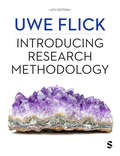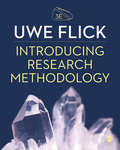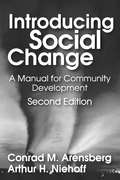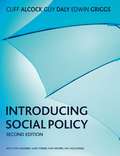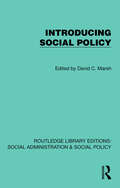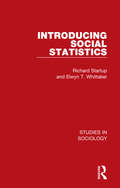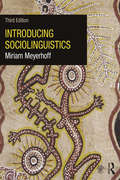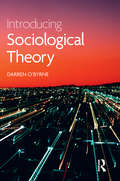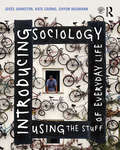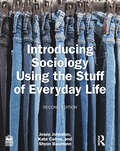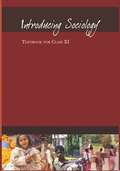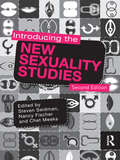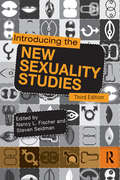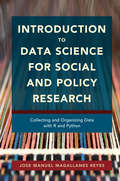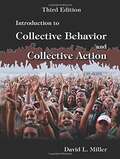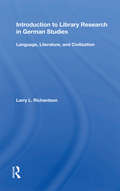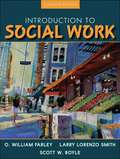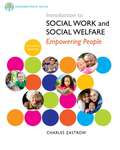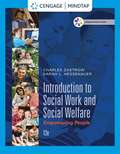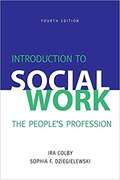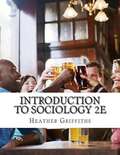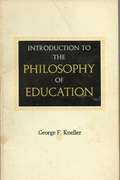- Table View
- List View
Introducing Research Methodology: Thinking Your Way Through Your Research Project
by Uwe FlickNew to research? This book helps you understand, think about and interpret each stage of the research process before you dive in. The holistic coverage helps you ′think through′ each step, from formulating questions and selecting methods to collecting data and analyzing results. With new content on the ethics of digital research, online interviews and data protection, you will also find: 10 new Student Research Spotlights that demonstrate how you can foster a reflexive mindset; A strong emphasis on social justice, including principles for culturally-responsive research and methodologies that challenge colonial perspectives; 34 case studies of real-world research that apply theory to global contexts, from Portugal to Germany to Canada. This new edition is essential for any undergraduate or postgraduate student looking to conduct social research with confidence and capability.
Introducing Research Methodology: Thinking Your Way Through Your Research Project
by Uwe FlickOffering an encyclopedic introduction to research, this book shows you how to think about every stage of their project and equips you with the tools you need to understand different research processes. Packed with examples showing the diversity of research, this third edition provides hands-on guidance to help: Develop key academic skills like critical thinking, effective writing and building an argument Confidently interpret findings, assess arguments and understand the wider impact of their research Understand the challenges and opportunities involved in working with new types of data like social media and online data Supported by a dynamic new website with downloadable templates, case studies, dos and don’ts videos and more, this practical book prepares you for not just getting to grips with methodological concepts, but being ready to apply them.
Introducing Research Methodology: Thinking Your Way Through Your Research Project
by Uwe FlickOffering an encyclopedic introduction to research, this book shows you how to think about every stage of their project and equips you with the tools you need to understand different research processes. Packed with examples showing the diversity of research, this third edition provides hands-on guidance to help: Develop key academic skills like critical thinking, effective writing and building an argument Confidently interpret findings, assess arguments and understand the wider impact of their research Understand the challenges and opportunities involved in working with new types of data like social media and online data Supported by a dynamic new website with downloadable templates, case studies, dos and don’ts videos and more, this practical book prepares you for not just getting to grips with methodological concepts, but being ready to apply them.
Introducing Social Change: A Manual for Community Development
by Conrad M. ArensbergThe development of industry in Europe and the United States has resulted in great marvels of production. However, non-Western nations, with a few exceptions, have not yet shared fully in this productivity, despite the desires of their leaders to do so. Also, in the United States, and in other industrial nations, there are sizeable minority groups which have not been fully assimilated into the productive pattern of the majority. Most live as poverty enclaves within the greater society. This socioeconomic imbalance has contributed to unrest in both the agrarian and industrial nations.Introducing Social Change deals with numerous topics of social change: cultural problems of change in general; a description of the concept of culture; a discussion of cultural change in its various forms; an introduction to the process of directed change; a discussion of the motivation necessary to bring about change; a treatment of the method of adapting an innovation to existing ideas and customs; the profile of the primary characteristics of most developing nations; the main characteristics and cultural values of America as a sample urban, industrial culture; and field problems of the change agent, and in particular those methods from anthropology that can be modified for use.Developments in the industrial countries, particularly the United States, have demonstrated the need for this second edition. When the original version was produced, little thought or activity was given to development efforts among ethnic minorities of industrial countries. Development was thought of almost exclusively as an activity relevant to the developing, non-industrial nations. It has become apparent that ethnic groups in industrial nations are also in need of economic development. Government policies, including funding, have been increasingly pointed in this direction.
Introducing Social Policy
by Guy Daly Cliff Alcock Edwin GriggsThe completely revised second edition of this highly respected textbook provides a comprehensive yet digestible and accessible introduction to the theoretical foundations, development and crucial areas of contemporary concern in social policy and welfare. Fully up to date, it provides a concise but thorough overview of the context for the provision of social welfare in contemporary Britain and beyond. Providing an integrated framework to highlight the relationships between theory, policy and practice, Introducing Social Policy examines social policy from a multi-disciplinary perspective. It therefore encourages a broad understanding of the importance of the subject within social policy itself, as well in social work, healthcare, education and beyond.
Introducing Social Policy (Routledge Library Editions: Social Administration & Social Policy)
by David C. MarshOriginally published in 1979, this book concentrates on the major developments in social policy in the second half of the 20th century. The first part considers these in relation to the economic and social environment, comprising essays on social policy in relation to industry, urban planning, and housing need. Further chapters consider social policies designed to meet individual needs such as education, health, and the maintenance of income. The final section deals with personal social services, and the relation of social policy to crime. For its breadth and scope of coverage the book will be of interest to all students of the history of social policy and social work.
Introducing Social Statistics (Studies in Sociology)
by Richard Startup Elwyn T. WhittakerOriginally published in 1982, this book describes those basic ideas and techniques of statistics which should be known to every social scientist. The explanations are given in careful detail at a level of mathematical sophistication which will be readily attainable by students meeting statistical methods for the first time. All the methods described are applied to, and sometimes are motivated by, genuine problems of interest arising in sociology, social policy, politics or human geography. The authors often provide a meaningful discussion of the substantive problem itself in addition to an analysis of the statistical techniques being used on it. In this way subject matter and statistical techniques are integrated in an original and effective manner. The authors combine considerable experience of shared teaching of social statistics with familiarity with its use in practical fields and in research. Their book therefore focuses on the most directly applicable methods and is carefully sequenced to promote rapid student understanding. The topic of probability – which so often confuses students – is here dealt with simply yet thoroughly. The chapter on the sources of social statistics, whilst being unusual in a text of this kind, is particularly welcome and comprehensively meets the needs of students on a wide range of courses. Introducing Social Statistics will make the vitally important field of statistics accessible to all students of the social sciences.
Introducing Sociolinguistics
by Miriam MeyerhoffThis third edition of Miriam Meyerhoff’s highly successful textbook provides a solid, up-to-date appreciation of the interdisciplinary nature of the field and covers foundation issues, recent advances and current debates. It presents familiar or classic data in new ways, and supplements the familiar with fresh examples from a wide range of languages and social settings. It clearly explains the patterns and systems that underlie language variation in use, as well as the ways in which alternations between different language varieties index personal style, social power and national identity. New features of the third edition: Every chapter has been revised and updated with current research in the field, including material on sexuality, polylanguaging and lifespan change; Additional Connections with theory and Facts: No, really? are included throughout; Data from sign languages, historical linguistics and Asia-Pacific sociolinguistics have been revised and expanded; A brand new companion website featuring more examples and exercises can be found at www.routledge.com/textbooks/meyerhoff. Chapters include exercises that enable readers to engage critically with the text, break-out boxes making connections between sociolinguistics and linguistic or social theory, and brief, lively add-ons guaranteed to make the book a memorable and enjoyable read. With a full glossary of terms and suggestions for further reading, this text gives students all the tools they need for an excellent command of sociolinguistics. It can also be used in conjunction with The Routledge Sociolinguistics Reader, Doing Sociolinguistics and the online resources shared by all three books.
Introducing Sociological Theory
by Darren O'ByrneIntroducing Sociological Theory offers a comprehensive, navigable and highly readable introduction to the main schools of thought in sociology, along with the philosophical ideas that underpin them. 8 broad theoretical traditions, or perspectives, are explained helping you to recognize the scope and range of sociological theory and to think sociologically and see the social world in different ways. The author skilfully and revealingly engages with each theoretical perspective showing what it actually means, why it utilises certain concepts over others, and how it generates and derives from evolving traditions of sociological thought. Introducing Sociological Theory is an essential text for all sociology students and of key interest more broadly within the social sciences and humanities.
Introducing Sociology Using the Stuff of Everyday Life
by Josee Johnston Kate Cairns Shyon BaumannThe challenges of teaching a successful introductory sociology course today demand materials from a publisher very different from the norm. Texts that are organized the way the discipline structures itself intellectually no longer connect with the majority of student learners. This is not an issue of pandering to students or otherwise seeking the lowest common denominator. On the contrary, it is a question of again making the practice of sociological thinking meaningful, rigorous, and relevant to today’s world of undergraduates. This comparatively concise, highly visual, and affordable book offers a refreshingly new way forward to reach students, using one of the most powerful tools in a sociologist’s teaching arsenal—the familiar stuff in students’ everyday lives throughout the world: the jeans they wear to class, the coffee they drink each morning, or the phones their professors tell them to put away during lectures. A focus on consumer culture, seeing the strange in the familiar, is not only interesting for students; it is also (the authors suggest) pedagogically superior to more traditional approaches. By engaging students through their stuff, this book moves beyond teaching about sociology to helping instructors teach the practice of sociological thinking. It moves beyond describing what sociology is, so that students can practice what sociological thinking can do. This pedagogy also posits a relationship between teacher and learner that is bi-directional. Many students feel a sense of authority in various areas of consumer culture, and they often enjoy sharing their knowledge with fellow students and with their instructor. Opening up the sociology classroom to discussion of these topics validates students’ expertise on their own life-worlds. Teachers, in turn, gain insight from the goods, services, and cultural expectations that shape students’ lives. While innovative, the book has been carefully crafted to make it as useful and flexible as possible for instructors aiming to build core sociological foundations in a single semester. A map on pages ii–iii identifies core sociological concepts covered so that a traditional syllabus as well as individual lectures can easily be maintained. Theory, method, and active learning exercises in every chapter constantly encourage the sociological imagination as well as the "doing" of sociology.
Introducing Sociology Using the Stuff of Everyday Life
by Josee Johnston Kate Cairns Shyon BaumannThe challenges of teaching a successful introductory sociology course today demand materials very different from the norm. It is a question of making the practice of sociological thinking meaningful, rigorous, and relevant to today’s world of undergraduates.This comparatively concise, highly visual, and engaging book offers a refreshingly new way forward to reach students, using one of the most powerful tools in a sociologist’s teaching arsenal – the familiar stuff in students’ everyday lives throughout the world: the jeans they wear to class, the coffee they drink each morning, or the phones their professors tell them to put away during lectures.A focus on consumer culture, seeing the strange in the familiar, is not only interesting for students; it is also (the authors suggest) pedagogically superior to more traditional approaches. By engaging students through their stuff, this book moves beyond teaching about sociology to helping instructors teach the practice of sociological thinking. It moves beyond describing what sociology is so that students can practice what sociological thinking can do. This pedagogy also posits a relationship between teacher and learner that is bi-directional. Many students feel a sense of authority in various areas of consumer culture, and they often enjoy sharing their knowledge with fellow students and with their instructor. Opening up the sociology classroom to discussion of these topics validates students’ expertise on their own life-worlds. Teachers, in turn, gain insight from the goods, services, and cultural expectations that shape students’ lives.While innovative, the book has been carefully crafted to make it as useful and flexible as possible for instructors aiming to build core sociological foundations in a single semester. A map on pages xix–xx identifies core sociological concepts covered so that a traditional syllabus as well as individual lectures can easily be maintained. Theory, method, and active learning exercises in every chapter constantly encourage the sociological imagination as well as the “doing” of sociology.This new edition is thoroughly revised and updated, incorporating the latest research around material sociology, culture, and object-oriented studies. New teaching materials and illustrations are included. Online resources to support teaching and learning include: Videos, flashcards, quizzes, and further reading Instructor’s manual, PowerPoints, and test bank
Introducing Sociology class 11 - Goa Board
by Goa Board of Secondary and Higher Secondary Education Alto Betim GoaThe "Introducing Sociology" textbook for Class XI offers an introduction to sociology by exploring key sociological concepts and the discipline's relevance in understanding society. It emphasizes the interplay between individuals and the larger society, highlighting how personal issues often reflect broader social phenomena. The book covers topics such as social institutions, culture, socialization, and research methods, while addressing issues of inequality, stratification, and social change. It encourages critical thinking, using real-world examples to engage students in understanding how society functions and how they fit into it. The text integrates activities to foster reflection and active learning, promoting a deeper grasp of sociological perspectives.
Introducing Sociology class 11 - Meghalaya Board
by National Council of Educational Research and TrainingA great book for introducing students to Sociology, this Introducing Sociology Textbook will be ideal for the students, who are to appear for their final examination of class 11. The enriched content follows close parity with the syllabus and guidelines that have been set by the CBSE. Published by NCERT, it guarantees thorough learning in the form of easy to grasp, clear English.
Introducing Sociology class 11 - NCERT - 23
by National Council of Educational Research and Training"Introducing Sociology" for Class XI by NCERT is an introductory textbook that provides a foundational understanding of sociology to high school students. The book delves into the basic concepts, theories, and methods of sociology, aiming to acquaint students with the discipline's perspectives on society, culture, and human interaction. It explores topics such as the history and development of sociology, the significance of social institutions like family and religion, and the role of social stratification and social change in shaping human experiences. Through a combination of theoretical discussions, case studies, and real-life examples, the textbook encourages students to observe the world around them sociologically, questioning and understanding the social constructs that influence their daily lives. The content is presented in a student-friendly manner, fostering critical thinking and laying the groundwork for further study in the field.
Introducing the New Sexuality Studies
by Steven Seidman Nancy FischerBreaking new ground, both substantively and stylistically, Introducing the New Sexuality Studies, Second Edition offers students and academics an engaging, thought-provoking introduction and overview of the social study of sexualities. Its central premise is to explore the social construction of sexuality, the role of social differences such as race or nationality in creating sexual variation, and the ways sex is entangled in relations of power and inequality. Through this approach the field of sexuality is considered in multicultural, global, and comparative terms, and from a truly social perspective. The second edition of this definitive textbook consists of over seventy-five short, original essays on the key topics and themes in sexuality studies. It also includes interviews with fourteen leading scholars in the field, which convey some of the most innovative work currently being undertaken. Each contribution is original, presenting the latest thinking and research in clear and accessible terms, using engaging examples to illustrate key points. This topical and timely volume will be an invaluable resource to all those with an interest in sexuality studies, gender studies and LGBTQ studies.
Introducing the New Sexuality Studies: 3rd Edition
by Steven Seidman Nancy L. FischerIntroducing the New Sexuality Studies is an innovative, reader-friendly anthology of original essays and interviews that introduces the field of sexuality studies to undergraduate students. Examining the social, cultural, and historical dimensions of sexualities, this anthology is designed to serve as a comprehensive textbook for sexualities and gender-related courses at the undergraduate level. The book’s contributors include both well-established scholars, including Patricia Hill Collins, Jeffrey Weeks, Deborah L. Tolman, and C.J. Pascoe, as well as emerging voices in sexuality studies. This collection will provide students of sociology, gender, and sexuality with a challenging and broad introduction to the social study of sexuality that they will find accessible and engaging.
Introduction to Data Science for Social and Policy Research: Collecting and Organizing Data with R and Python
by José Manuel Magallanes ReyesReal-world data sets are messy and complicated. Written for students in social science and public management, this authoritative but approachable guide describes all the tools needed to collect data and prepare it for analysis. Offering detailed, step-by-step instructions, it covers collection of many different types of data including web files, APIs, and maps; data cleaning; data formatting; the integration of different sources into a comprehensive data set; and storage using third-party tools to facilitate access and shareability, from Google Docs to GitHub. Assuming no prior knowledge of R and Python, the author introduces programming concepts gradually, using real data sets that provide the reader with practical, functional experience. Examines real data sets to demonstrate actual, messy problems and their solutions. Introduces the reader to both Python and R without any prerequisites. Provides a contemporary, data-driven approach for social science and public management.
Introduction To Collective Behavior And Collective Action
by David L. MillerDavid Miller's expanded third edition makes it the definitive source on collective behavior and collective action. Up-to-date and meticulously researched, this popular volume continues to provide a systematic overview of theory and research. Each topic is meaningfully linked to the appropriate theories of collective behavior (mass hysteria, emergent-norm, and value-added perspectives) and collective action (social-behavioral interactionist, resource mobilization, and perception control perspectives). Rumor, mass hysteria, fads and fashion, UFOs, sports, migrations, disasters, riots, protest, and social movements are among the topics presented in a unique side-by-side presentation of the two disciplines. In an engaging, accessible style, Miller offers detailed discussion of classic sociological studies interspersed with intriguing modern-day examples that students will enjoy reading. His thorough topical treatment effectively reduces the need for outside readings. New to this edition: A new emphasis on the impact of social media, technology, and citizen journalism on social movements, including resource mobilization, rumor and communication, disaster response, and documentation of human rights abuses and political protest such as the Arab Spring, the Tea Party movement, and the Occupy movement. Comprehensive discussion of economic globalization, the alter-globalization movement, and transnational activism, including the strategic incapacitation approach to the policing of large global demonstrations. Insightful analysis and application of the latest egress-modeling and crowd-control computer simulations and qualitative data-analysis software. Improved graphics and new photos that enhance the author's updated treatment, and an intriguing appendix on the social psychology of George Herbert Mead by collective behavior/collective action authority and crowd behavior expert Clark McPhail.
Introduction To Library Research In German Studies: Language, Literature, And Civilization
by Larry L. RichardsonThis book introduces Germanists to the mechanics and methodology of modern library research. It explains the use of various bibliographic access systems, providing step-by-step search strategies to the most modern computerized data bases for the whole field of German studies.
Introduction To Social Work (11th edition)
by O. William Farley Scott W. Boyle Larry Lorenzo SmithWith its balanced presentation of social work and social welfare, this classic book provides a comprehensive and historical view of social work to help readers better understand and appreciate the profession. It emphasizes the generalist practice perspective and answers students' questions about social work and their social work education. Cases help students apply theory to practice and provide a glimpse of what social workers do as well as illustrate the versatility of the profession.
Introduction To Social Work And Social Welfare
by Charles ZastrowThe bestselling introductory Social Work book on the market, Zastrow's INTRODUCTION TO SOCIAL WORK AND SOCIAL WELFARE: EMPOWERING PEOPLE, 11th Edition, is also lauded for being the most comprehensive. In addition to giving readers a thorough overview of the social work profession, this text offers a realistic view of social problems in contemporary society, equipping students with real-world insight that they can apply in practice. By presenting positive strategies in the context of the core values, ethics, skills, and knowledge base of today's professional social worker, Zastrow encourages readers to think critically about new, workable methods for problem-solving and empowering clients. Contemporary social problems case studies, exhibits, and tables help users apply concepts and compare and contrast issues. The Eleventh Edition has been thoroughly updated to include the latest NASW Standards, as well as new and emerging issues from the field. Packed with cutting-edge coverage and comprehensive CSWE core content, INTRODUCTION TO SOCIAL WORK AND SOCIAL WELFARE: EMPOWERING PEOPLE, 11th Edition, continues to inspire readers while giving them insight into real-world practice.
Introduction To Social Work And Social Welfare: Empowering People
by Charles ZastrowThe bestselling introductory Social Work text on the market, Zastrow's INTRODUCTION TO SOCIAL WORK AND SOCIAL WELFARE: EMPOWERING PEOPLE is lauded for being the most comprehensive and practical text available for beginning social workers. In addition to giving readers a thorough overview of the social work profession, this text offers a realistic view of social problems in contemporary society, equipping students with real-world insight that they can apply in practice. By presenting positive strategies in the context of the core values, ethics, skills, and knowledge base of today's professional social worker, Zastrow encourages students to think critically about new, workable methods for problem-solving and empowering clients. Case studies of contemporary social problems, exhibits, and tables help students apply concepts and compare and contrast issues. The twelfth edition has been thoroughly updated to align with the latest EPAS (2015) from CSWE, and offers insights into new and emerging issues from the field.
Introduction To Social Work: The People's Profession
by Ira Colby Sophia F. DziegielewskiThere are certain questions that all students considering social work ask. Who are social workers? What is it that social workers do? How is the social work profession changing? What does it take to become a social worker? Ira Colby and Sophia Dziegielewski bring their decades of experience in social work practice and education to answer these questions. This engaging text gives readers a practical guide to the many ways in which social workers effect change in their communities and the world. The authors offer an overview and history of the profession; introduce readers to the practice of social work at the micro, mezzo, and macro level; and finally look closely at the many settings and populations that social workers work with. While realistically portraying the pressures and obstacles that social workers face, Colby and Dziegielewski communicate their own passion for social work.
Introduction To Sociology (Second Edition)
by Heather Griffiths Nathan Keirns Eric Strayer Susan Cody-Rydzewski Gail Scaramuzzo Tommy Saddler Sally Vyain Jeff Bry Faye JonesIntroduction to Sociology 2e adheres to the scope and sequence of a typical, one-semester introductory sociology course. It offers comprehensive coverage of core concepts, foundational scholars, and emerging theories, which are supported by a wealth of engaging learning materials. The textbook presents detailed section reviews with rich questions, discussions that help students apply their knowledge, and features that draw learners into the discipline in meaningful ways. The second edition retains the book’s conceptual organization, aligning to most courses, and has been significantly updated to reflect the latest research and provide examples most relevant to today’s students. In order to help instructors transition to the revised version, the 2e changes are described within the preface.
Introduction To The Philosophy Of Education
by E. KnellerThe purpose of this book is to outline those elements of philosophy that are relevant to a proper understanding of education and the task of teaching. Much of the content comes from a text that I edited, entitled Foundations of Education (Wiley, 1963). I have rewritten and in places enlarged the original, especially the sections on existentialism and logical analysis, which I have assigned to a separate chapter.
